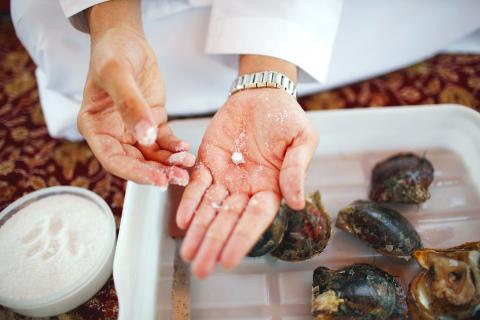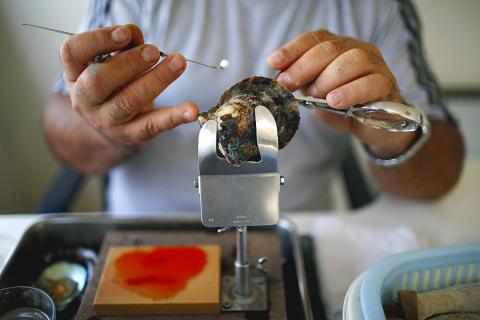Abdulla al-Suwaidi dreamed of reviving a long-lost part of Middle Eastern culture when he seeded his first oyster with a tiny bead and placed it in the warm waters of the Gulf in 2004.
Almost a decade later, the cofounder and vice-chairman of RAK Pearls is finally seeing the fruits of his labor with the first auction of cultured pearls from RAK’s oyster farm off the coast of Ras al-Khaimah, one of seven emirates that make up the United Arab Emirates.
“We’re seeing today a revival of a culture, a treasure that’s been lost to us for many, many years,” al-Suwaidi said in an interview.

Photo: Reuters
Natural pearl diving was once the main income of many families in the region, but it vanished after World War I with the development of vast oil reserves in the Gulf and the rise of competition from Japanese cultured pearls.
RAK Pearls, the region’s only cultured pearl producer, now has about 40,000 oysters bedded down in the Gulf’s briny waters and in June, the Dubai Multi Commodities Centre Authority (DMCC) held an exclusive auction for some of its produce.
“Dubai has been a trading center of pearls for many years, but this is the first time that we auction locally cultivated pearls with a quality that surpasses anything that you’ve seen farmed in countries like China and Japan,” DMCC executive vice chairman Ahmed bin Sulayem said.

Photo: Reuters
The value of traded natural and cultured pearls through nearby Dubai grew by an average 25 percent annually between 2003 and 2011 to hit US$30 million a year in the past few years, while volumes have risen 10 percent annually, DMCC director of commodity services Franco Bosoni said.
Prices per pearl could hit as much as 1 million UAE dirhams (US$272,300), RAK’s Japanese board director Daiji Imura said. Smaller pearls could sell for as little as 1 dirham.
Historically, natural pearls were symbols of style and an important indicator of wealth and status in the Middle East.
Until the decline of the natural pearl market, local fishermen throughout the Gulf used to dive deep into the waterway’s warm waters, hunting for the pearls which provided a main source of income for many people.
The Gulf has produced fine jewelry for thousands of years, and the best natural pearls appeared in the jewelry of kings and queens.
RAK Pearls intends to grows its production of 40,000 oysters to about 200,000 in a few years, but considers it more than just a business.
“Pearls are mentioned in our poems, books and even the names of our daughters,” al-Suwaidi said.
His firm has adopted the Japanese pearl farming technology of inserting tiny beads made from mother of pearl into oysters along with a small piece of the mantle organ from a donor oyster.
The mollusk then naturally coats the bead with layers of a substance called nacre — the same hard, iridescent material that lines its inner shell and is known as mother of pearl.
The oyster is then placed back in the water and over several months, the buildup of nacre layers eventually creates what is known as a cultured pearl.
Holding tweezers and a small sharp blade, RAK’s pearl-seeding expert Lutfi Hasayed treats the oysters with the loving care of a doctor and the sharp eye of an artist.
“Success at our farm is 80 percent,” Hasayed said from his air-conditioned workspace near the turquoise waters.
That is just as well, as the project is partly owned by the government of Ras al-Khaimah and expected to become part of the tourist trail as well as contribute to the food industry.
Waste from the shells is used as fertilizer and the oyster meat is served at the company’s Japanese restaurant chain in the emirate.
“This is a pilot project and we’re receiving interest from investors across the region to duplicate it in other countries,” RAK marketing manager Mohammed al-Suwaidi said.
“We plan to bring the pearling industry of the Gulf back to its golden days,” he said.

The Eurovision Song Contest has seen a surge in punter interest at the bookmakers, becoming a major betting event, experts said ahead of last night’s giant glamfest in Basel. “Eurovision has quietly become one of the biggest betting events of the year,” said Tomi Huttunen, senior manager of the Online Computer Finland (OCS) betting and casino platform. Betting sites have long been used to gauge which way voters might be leaning ahead of the world’s biggest televised live music event. However, bookmakers highlight a huge increase in engagement in recent years — and this year in particular. “We’ve already passed 2023’s total activity and

Nvidia Corp CEO Jensen Huang (黃仁勳) today announced that his company has selected "Beitou Shilin" in Taipei for its new Taiwan office, called Nvidia Constellation, putting an end to months of speculation. Industry sources have said that the tech giant has been eyeing the Beitou Shilin Science Park as the site of its new overseas headquarters, and speculated that the new headquarters would be built on two plots of land designated as "T17" and "T18," which span 3.89 hectares in the park. "I think it's time for us to reveal one of the largest products we've ever built," Huang said near the

China yesterday announced anti-dumping duties as high as 74.9 percent on imports of polyoxymethylene (POM) copolymers, a type of engineering plastic, from Taiwan, the US, the EU and Japan. The Chinese Ministry of Commerce’s findings conclude a probe launched in May last year, shortly after the US sharply increased tariffs on Chinese electric vehicles, computer chips and other imports. POM copolymers can partially replace metals such as copper and zinc, and have various applications, including in auto parts, electronics and medical equipment, the Chinese ministry has said. In January, it said initial investigations had determined that dumping was taking place, and implemented preliminary

Intel Corp yesterday reinforced its determination to strengthen its partnerships with Taiwan’s ecosystem partners including original-electronic-manufacturing (OEM) companies such as Hon Hai Precision Industry Co (鴻海精密) and chipmaker United Microelectronics Corp (UMC, 聯電). “Tonight marks a new beginning. We renew our new partnership with Taiwan ecosystem,” Intel new chief executive officer Tan Lip-bu (陳立武) said at a dinner with representatives from the company’s local partners, celebrating the 40th anniversary of the US chip giant’s presence in Taiwan. Tan took the reins at Intel six weeks ago aiming to reform the chipmaker and revive its past glory. This is the first time Tan